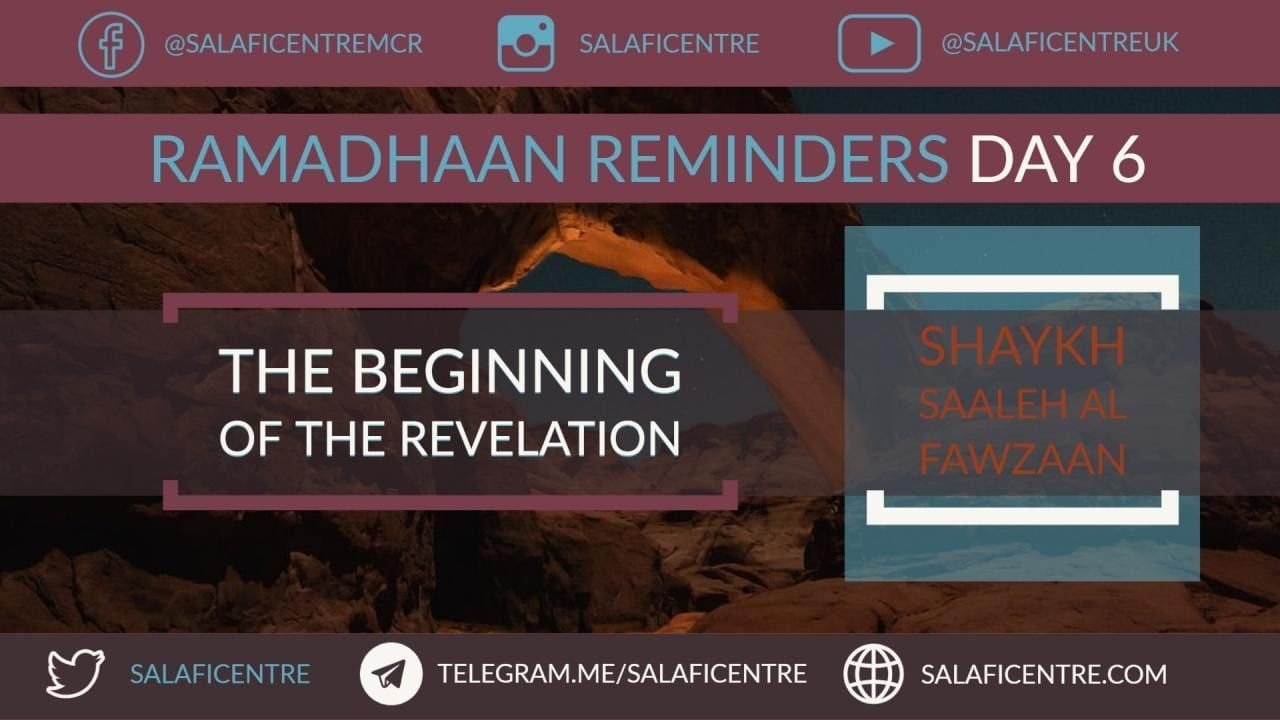In The Name of Allaah, The Most Merciful, The Bestower of Mercy.
Battle With The Soul When Urged Towards Evil
Imam Ibn Al-Qayyim [may Allah have mercy upon him] stated:
A servant of Allah does not embark upon what he has been forbidden except through two ways: Firstly, (either) harbouring evil thoughts about his Lord that if he were to obey Allaah and preferred Him, He (Glorified be He) will not grant him that which is better from the lawful (things), or his acknowledgement (i.e. that Allaah will grant him something better than the forbidden thing he pursues) and that whoever leaves something for Allah’s sake, He (Glorified be He) will replace it with something better; but lusts overcomes his patience and desires his intellect. The first affair is due to weakness in knowledge and the second a weakness in intellect and insight”. [Al-Fawaa’id. Page 78]
Al-Allamah Abdur-Rahman Ibn Yahyah Al-Mu’allimee [may Allah have mercy upon him] stated:
The human being does not hate truth as a result of considering it to be falsehood, but he loves truth by way of his Fitra (natural inclination) and loves falsehood due to his desires and lusts. The shift towards success or loss defends on what he gives preference to. Allaah (The Blessed and Exalted) said:
فَأَمَّا مَن طَغَىٰ
وَءَاثَرَ ٱلۡحَيَوٰةَ ٱلدُّنۡيَا
فَإِنَّ ٱلۡجَحِيمَ هِىَ ٱلۡمَأۡوَىٰ
وَأَمَّا مَنۡ خَافَ مَقَامَ رَبِّهِۦ وَنَهَى ٱلنَّفۡسَ عَنِ ٱلۡهَوَىٰ
فَإِنَّ ٱلۡجَنَّةَ هِىَ ٱلۡمَأۡوَىٰ
Then, for him who Tagha (transgressed) and preferred the life of this world (by following his evil desires and lusts), Verily, his abode will be Hell-fire; But as for him who feared standing before his Lord, and restrained himself from impure evil desires, and lusts. Verily, Paradise will be his abode. [Surah An-Naazi’aat. Aayaat 37-41]
And you can say: Allah (The Blessed and Exalted) is on one side and (a person’s evil) desires are on another side (in opposition to what Allaah has commanded and prohibited). Allaah (The Most High) said:
أَرَءَيۡتَ مَنِ ٱتَّخَذَ إِلَـٰهَهُ ۥ هَوَٮٰهُ أَفَأَنتَ تَكُونُ عَلَيۡهِ وَڪِيلاً
أَمۡ تَحۡسَبُ أَنَّ أَڪۡثَرَهُمۡ يَسۡمَعُونَ أَوۡ يَعۡقِلُونَۚ إِنۡ هُمۡ إِلَّا كَٱلۡأَنۡعَـٰمِۖ بَلۡ هُمۡ أَضَلُّ سَبِيلاً
Have you (O Muhammad) seen him who has taken as his ilah (god) his own desire? Would you then be a Wakil (a disposer of his affairs or a watcher) over him? Or do you think that most of them hear or understand? They are only like cattle; nay, they are even farther astray from the Path. (i.e. even worst than cattle).” [Surah Al-Furqaan. Aayaat 43-44]
And Allah (The Most High) said:
أَفَرَءَيۡتَ مَنِ ٱتَّخَذَ إِلَـٰهَهُ ۥ هَوَٮٰهُ وَأَضَلَّهُ ٱللَّهُ عَلَىٰ عِلۡمٍ۬ وَخَتَمَ عَلَىٰ سَمۡعِهِۦ وَقَلۡبِهِۦ وَجَعَلَ عَلَىٰ بَصَرِهِۦ غِشَـٰوَةً۬ فَمَن يَہۡدِيهِ مِنۢ بَعۡدِ ٱللَّهِۚ أَفَلَا تَذَكَّرُونَ
Have you seen him who takes his own lust (vain desires) as his ilah (god), and Allah knowing (him as such), left him astray, and sealed his hearing and his heart, and put a cover on his sight. Who then will guide him after Allah? Will you not then remember?” [Soorah Al-Jaathiyah. Ayah 23] [لتَّنْكِيل بِماَ فِي تَأْنِيبِ ٱلْكَوْثَري مِنَ الأباَطِيل – with the checking of Imaam Albaanee (rahimahullaah). 2/179]
Subtle Desire For Position, Fame etc
Shaikh Al-Islam Ibn Taymiyyah [may Allah have mercy upon him] said:
There are many cases where the (desires) of the souls are mixed with Ash-Shahawaat Al-Khafiyyah [i.e. desires that are concealed, subtle etc] that corrupts its fulfilment of (perfect) love of Allaah, servitude to Him and establishment of the religion sincerely for the sake of Allaah, just as Shaddaad Ibn Aws [may Allaah be pleased with him] said, “O Arabs! Indeed, the affair I fear for you the most is Riyaa and Shahwa Al-Khafiyyah”. It was said to Abu Daawud As-Sijistaani, “What is Ash-Shahwa Al-Khafiyyah?” He said, “Love of leadership”. [Majmoo Al-Fataawaa 10 /214-215]
Illegal Partisanship
Al-Allamah Abdur Rahmaan Bin Yahyah Al-Mu’allimee [may Allah have mercy upon him] said:
A person is nurtured upon a religion, creed, school of thought or views acquired from his nurturer and teacher, which he considers to be the truth and followed it for a long time; then when it becomes clear to him that (such religion, creed, view or school of thought) is false, it becomes difficult for him to acknowledge, just as when his forefathers, ancestors or the one he follows are upon a (particular) way and then its falsity is clarified for him. This is because he sees that their deficiencies necessitate his own deficiencies and acknowledgement of their misguidance or errors necessitates his own deficiencies. In this era of ours, you even see a woman who comes across an affair related to the religion – in which there is a difference of opinion between the mother of the believers Aa’isha and others amongst the companions [may Allaah be pleased with all of them], so she defends Aa’isha’s position solely due to the fact that she is a woman like her. So, when she presumes and then claims that Aa’Isha is correct and those men who oppose her position are mistaken, then in this is an affirmation of Aa’Isha’s virtue over those men, which then becomes a virtue for women unrestrictedly and she receives some of that. And through this appears – to you – the underlying reasons behind the illegal partisanship of an Arab to an Arab, a Persian to a Persian, a Turk to a Turk and other than that. [An Excerpt From Aathaar Ash-Shaikh Al-Allaamah Abdur Rahmaan Bin Yahyah Al-Mu’allimee. Vol 11. Page 294]
Conversation between Abu Jahl and His Nephew Al-Musawwar Bin Makhzamah
Al-Musawwar Bin Makhzamah: ‘’O my uncle! Did you use to accuse Muhammad of lying before he started saying what he says now [i.e. his call to Tawheed]?
Abu Jahl: “By Allah, indeed Muhammad was a trustworthy young man amongst us and we have never experienced lying from him.
Al-Musawwar Bin Makhzamah: “O my uncle! So why is it that you do not follow him?”
Abu Jahl: “O son of my sister! We competed with Banu Hashim in nobility [i.e. which clan is more noble], so they used to feed [the pilgrims] and we used to feed the [pilgrims]; they used to provide water for [the pilgrims] and we used to provide water for [the pilgrims]; they used to give protection [to the destitute] and we used to give protection [to the destitute] until we were equal [i.e. in competing one another for nobility]. Then they said, “There is a Prophet from us”, so when are we going to get something similar to this!!
Conversation between Abu Jahl and Akhnas Bin Shuraiq
Akhnas Bin Shuraiq said to Abu Jahl on the day of Badr [i.e. the battle of Badr]: “O Abul Hakam! Inform me about Muhammad, as to whether he is a truthful person or a liar, for indeed there is no one here from Quraish who will hear our speech?
Abu Jahl replied to Akhnas: “Woe to you! By Allaah, indeed Muhammad is a truthful person and Muhammad has never lied, but if Banu Qusay take the leadership, the position of gatekeepers of the Kabah, providers of water for the pilgrims and Prophet hood [i.e. the Prophet Muhammad is from their clan], then what will the rest of Quraish have?! [Hidaayatul Hayaaraa Fee Ajwibatil Yahood Wan-Nasaaraa’ pages 18-19]
Shaikh Al-Islam Ibn Taymiyyah [may Allah have mercy upon him] said:
إنّ الإنسانَ قد يَعرفُ أنّ الحقَّ مع غيره،ومع هذا يَجحدُ ذلك؛لحسدهِ إيّاه أو لطلبِ عُلُّوهِ عليه أو لهوى النّفسِ،ويَحملُه ذلك الهَوى على أنْ يعتديَ عليه ويَرُدَّ ما يقولُ بكلِّ طريقٍ،وهو في قلبهِ يَعلمُ أنّ الحقَّ معهُ”
(الإيمان)(ص١٥٢)
“Indeed, a person may know that the truth is with other than him, (but) despite this, he wilfully denies it due to his envy towards (the one with the truth) or due to seeking to be superior over him or due to desire; and this desire makes him trangress against him and rejects what he says in every way, whilst knowing – in his heart – that the truth is with him (i.e. the one he opposes).
A Subtle Affair Related to Inclinations
Al-Allaamah Rabee Bin Haadee Al-Mad’khalee [may Allah preserve him] also stated:
فيجب على كل مسلم أن يفتش نفسه فقد يميل إنسان إلى صاحب الحق لهوى ، فقبل أن يتبين له الحق يتمنى أن يكون فلان هو المنتصر بالحجة أو غيرها فتميل نفسه لأنه فلان ، ولو كان على الحق لا يجوز أن يوجد هذا الميل، فيقول: إذا وجد هذا الميل ولو مع صاحب الحق يكون من حكم الجاهلية ، وهذا أمر لا يخطر بالبال عند كثير من الناس .
فيجب على المسلم أن يراقب الله في القضايا المختلف فيها ، وأن يكون قصده فقط معرفة الحق سواء مع هذا أو مع ذاك .
ومن هنا يقول الشافعي : “إذا دخلت في مناظرة لا أبالي إذا كان الحق مع صاحبي أو معي” فلا يبالي ولا يتمنى أن يكون الحق معه بل يتمنى أن يكون مع صاحبه وأن تكون النصرة له ، هذا هو الخلق العالي وهذا هو الدين المستقيم
It is obligated to every Muslim to examine himself, for indeed a person might incline towards (another) person who is upon truth based on his desires; then even before the truth is clear to him, he wishes that such and such person should be the one aided with the proofs or something else, so, his soul inclines (towards that person) because he (i.e. that person) is such and such (personality). Therefore, even if that person is upon the truth, it is not permissible for this type of inclination to be present. If this type of inclination is present, even with the person upon truth, it is considered to be a trait of pre-Islamic ignorance. This is an affair that does not cross the minds of many people. Therefore, it is obligated on a Muslim – in relation to affairs wherein people differ- that he is attentive to the fact that Allaah knows, sees and hears everything, and his intention (goal or aim) should only be that he (wants) to know the truth whether it is with this or that person. And in relation to this, Imam Ash-Shafi’ee said, “When I enter into a discussion, I am not bothered whether the truth is with me or with the other person”. So, he is not bothered nor does he wish that the truth is with him; rather he wishes that it is either with the other person or with him. This is the lofty moral conduct and the upright religion. [http://www.rabee.net/ar/articles.php?cat=8&id=172. slightly paraphrased ]
A Subtle Affair Regarding Patience
Sa’eed Bin Jubayr [may Allah have mercy upon him] said, “Patience is the person’s acknowledgment that what has afflicted him is from Allah, seeking for reward from Allah and hoping for Allah’s good recompense. Indeed, a man maybe in a state of distress whilst he is being whipped, but you see nothing from him except patience”. [As-Sabr Wath-Thawaab Alayhi. By Ibn Abee Dunya page 113]
Regarding the statement “Patience is the person’s acknowledgement that what has afflicted him is from Allah”, Imam Ibn Al-Qayyim said, “It is as if this statement is an explanation of the statement “Innaa lil laah – to Allah we belong”. So, the person acknowledges that he belongs to Allah and his owner does whatever He wants with him.
Regarding the statement “Seeking for reward from Allah”, Imam Ibn Al-Qayyim Qayyim said, “It is as if this statement is an explanation of the statement “Wa Innaa Ilayhi Raaji’oon – and to Him (i.e. Allah) we shall return”, meaning we shall return to You, so that you reward us due to our patience and the reward for being patient during calamity will not be lost”.
Regarding the statement “Indeed, a man maybe in a state of distress whilst he is being whipped, but you do not see from him except patience”, Imam Ibn Al-Qayyim Qayyim said, “Patience is not that one bears the whip, rather it is to restrain the heart from getting angry with Allah’s decree and to restrain the tongue from complaining about Allah. Whoever is whipped and his heart is displeased with Allaah, then he is not one who is patient”. [Iddat As-Saabireen pages 183-184]
We ask Allaah:
اللَّهُمَّ إِنِّي أَعُوذُ بِكَ مِنَ الْعَجْزِ وَالْكَسَلِ وَالْجُبْنِ وَالْبُخْلِ وَالْهَرَمِ وَعَذَابِ الْقَبْرِ اللَّهُمَّ آتِ نَفْسِي تَقْوَاهَا وَزَكِّهَا أَنْتَ خَيْرُ مَنْ زَكَّاهَا أَنْتَ وَلِيُّهَا وَمَوْلاَهَا اللَّهُمَّ إِنِّي أَعُوذُ بِكَ مِنْ عِلْمٍ لاَ يَنْفَعُ وَمِنْ قَلْبٍ لاَ يَخْشَعُ وَمِنْ نَفْسٍ لاَ تَشْبَعُ وَمِنْ دَعْوَةٍ لاَ يُسْتَجَابُ لَهَا
O Allah! I seek refuge in You from helplessles incapacity, from laziness, cowardice, miserliness and sinility, and from punishment of the grave. O Allah! Grant to my soul righteousness and purify it, for You are the Best Purifier of it; You are its Protector and Guardian. O Allah! I seek refuge in You from the knowledge which does not benefit, a heart that does not fear (You), a the soul that does not become contented and a supplication that is not responded to. [Saheeh Muslim2722]










